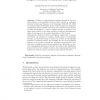275 search results - page 46 / 55 » On The Security of a Group Key Agreement Protocol |
TCC
2005
Springer
14 years 1 months ago
2005
Springer
Abstract. We prove a computational soundness theorem for the symbolic analysis of cryptographic protocols which extends an analogous theorem of Abadi and Rogaway (J. of Cryptology ...
ACNS
2009
Springer
14 years 2 months ago
2009
Springer
Abstract. We examine the use of randomness extraction and expansion in key agreement (KA) protocols to generate uniformly random keys in the standard model. Although existing works...
JOC
2011
12 years 10 months ago
2011
This paper is devoted to the design and analysis of short undeniable signatures based on a random oracle. Exploiting their online property, we can achieve signatures with a fully s...
IACR
2011
12 years 7 months ago
2011
In this paper we present the first public key encryption scheme that is structure preserving, i.e., our encryption scheme uses only algebraic operations. In particular it does not...
EUROCRYPT
2008
Springer
13 years 9 months ago
2008
Springer
Secure multi-party computation (MPC) is a central problem in cryptography. Unfortunately, it is well known that MPC is possible if and only if the underlying communication network...

